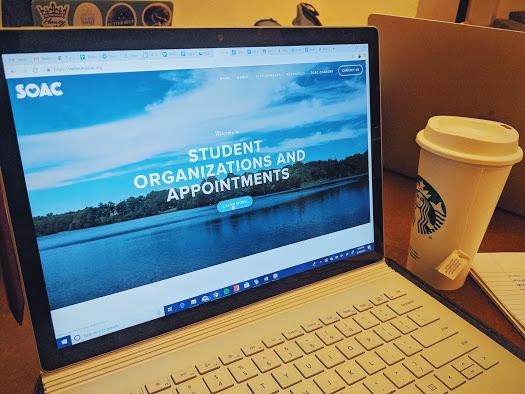On Feb. 19, the Student Organizations and Appointments Committee (SOAC) chairs and College Government Vice President Saafia Masoom ’19 announced that they were considering a proposal to split SOAC into two committees: one group handling student organization funding and regulation, and another appointing students to college-sponsored committees. These two functions are currently fulfilled by the same committee, which meets once a week for an hour.
Masoom, who chairs SOAC as one of her College Government Vice President duties, described their responsibilities: “We manage all 200+ orgs on campus, and we also appoint student representatives to committees,” such as the Board of Trustees, Transportation Advisory Committee, Sustainability Committee and the Committee on Curriculum and Academic Policy.
“We are proposing to dismantle it as it is now, and then rebuild it into two separate committees, and no longer have orgs and appointments together,” Masoom said. The structure would work like this: the appointments committee would still be chaired by the CGVP, while the organizations committee would be chaired by a new, paid, College Government Cabinet representative.
Masoom hopes the structure of the appointments committee would make it more able to appoint individuals who are well-suited for their positions. Unlike the current SOAC, this appointments committee “would be comprised of the student reps themselves.” 26 out of the current 68 student representatives who sit on committees would form a committee to appoint their successors. These 26 individuals would be assigned “in equal proportions to each type of committee,” such as trustee committees, curriculum committees, diversity and inclusion committees, and so on.
In regards to the potential new chair of student organizations, Masoom says SOAC has not picked a name for the new cabinet position. However, they are sure about what they want to call this group: “council on organization recognition and affairs, or CORA.”
However, when the proposal was introduced in Senate after Presidents’ Day Weekend, there was substantial pushback. Some students said the proposal was not well thought out, or that it would cause unnecessary strain on College Government in a year when many changes — such as the new organization recognition rules — are forcing quick adaptation.
“Change is scary to people, you know?” Masoom reflected. “And this is a system that I’m not sure a lot of people understand. That also makes change really scary. That’s why I felt like it was really important to take a step back, and get feedback before moving forward.” Now, Masoom — along with current Appointments Chairs Felicity Pollard ’20 and Erika Herman ’20 and Organizations Chair Emily Pearson ’20 — has worked on restructuring the proposal and adding detail. The question of whether or not to add the new cabinet position that would allow for this split to take place will be voted on in Senate on March 18.
Erika Herman, who is co-appointments chair, is excited about these potential changes and the way that they might allow the appointments process to run more smoothly. “I’m all ready for this change to happen,” she said. “SOAC as a committee only meets one week for an hour, so a lot of the work we do is done outside committee meetings. But even within that, the CGVP has to give time to both organizations and appointments within that hour, so orgs get a lot more focus and attention.” Currently, Herman and her co-chair Felicity Pollard say that there are about eight people in the appointments wing of SOAC. Often, this means that the committee is not able to even carry out tasks like interviewing student representative candidates quickly. Often, Pollard and Herman said, candidates are only able to be interviewed by two or three people, which “throws off the rating system.” Candidates are rated on a scale by each interviewer, then averaged between everyone who is there. This average can be altered, Pollard said, by the number of people there.
Pollard emphasized that to make board and committee selections fair, it is necessary to change this system: “Even Kimberly, the current CGP, was appointed to her position as a current student rep with only two people in the room, which was a SPEC violation!” she recalled. After the split, she hopes that her committee will be larger, and will represent a larger variety of perspectives on campus. “We don’t represent as many perspectives as we’d like…there’s incredible potential for bias in the system as it exists now,” she said. In the new system, “We’re trying to tap people who have actually gained a knowledge base there.”
Emily Pearson ’20, who is the Organizations Coordinator, is more skeptical of this plan. “I think this year definitely taught us that it’s really hard to balance both organizations and appointments in one committee at one time, and to really meet the needs of both and make sure they’re both being fully seen and served. This year, we went through all of the different org changes, which meant that for a time appointments were kind of shoved to the side. I just don’t know what the final form, the best form, of splitting this up should look like, that both meets the needs of students but also student voice on this campus,” she said.
“I think it’s the appointments side of things that I’m unsure of,” she said. “I was actually appointments coordinator my sophomore year, and I think that we should, in some ways, think a little bit bigger, and think about whether there are ways to work more closely with academic council, and promote students better there.” There is currently no student vote on Academic Council, the body that makes many major decisions that affect student life, such as curriculum regulation, class scheduling and grading policy. Though College Government (CG) cabinet members do attend, they have no voting power.
Masoom, however, is hopeful that these changes, if passed next week, will help students — both those who are on college government and those who are not. “Right now, the structure is not supporting people — people who are or aren’t involved in CG,” she said. “No matter which way you spin it,” the combined committees mean orgs and appointments will not get equal attention.
If next week’s policy creating the new cabinet position passes, then there will be special elections after Spring Break for both the College Government Vice President (CGVP) and the new CORA chair position. (If not, special elections will still be held, but only for the CGVP position.)
Regardless of what happens, Pearson is excited that these events have helped bring SOAC the spotlight in a way they rarely get. “I think that part of what’s been really exciting is that people are learning what SOAC is…it’s been really really exciting to get to think critically about what our role at this college is.”






